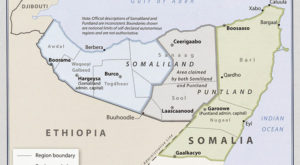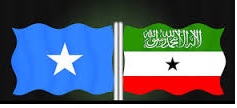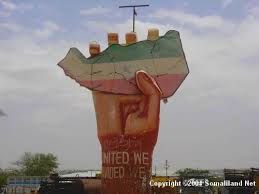By Osman Hassan
Once again, talks between Somalia and its renegade one-clan secessionist enclave calling itself Somaliland are in the offing. It looks as if the Turkish government is taking the bull by its horns and volunteering to midwife these talks. We wish them success in their mission so long as the endgame of these talks is consistent with Somalia’s unity and territorial integrity. But one has to be realistic. As this writer will argue, the secession can only be ended internally if the will is there and not through talks brokered by foreigners
 Much of the support for the secession is based on historical distortions or downright fabrications. For this reason, it is incumbent upon mediators whoever they might be, as it behoves all those members of the international community following the talks, to keep in mind that the genesis of Somaliland is that of its conquest by Great Britain. Until then, no country or territory existed with that specific name other than the generic one applicable to the Somali land in the Horn. Secondly, they should be cognizant of the manner in which each of the clans in the territory came to be part of the British colony, whether voluntarily or against its will. And thirdly, they would need to be mindful of the conditions under which the colony got its independence from Britain.
Much of the support for the secession is based on historical distortions or downright fabrications. For this reason, it is incumbent upon mediators whoever they might be, as it behoves all those members of the international community following the talks, to keep in mind that the genesis of Somaliland is that of its conquest by Great Britain. Until then, no country or territory existed with that specific name other than the generic one applicable to the Somali land in the Horn. Secondly, they should be cognizant of the manner in which each of the clans in the territory came to be part of the British colony, whether voluntarily or against its will. And thirdly, they would need to be mindful of the conditions under which the colony got its independence from Britain.
Except for the eastern regions of Sool, Sanaag and Cayn (SSC), Britain acquired the rest of its Somali territory in 1884 through simple persuasion. It made them believe that it was in their interest as hostile clans to sign separate protectorate treaties with it against each other. And so they obliged. When fellow clans in the same territory deemed the coloniser grabbing their lands as their protector against each other what that clearly demonstrates is the absence of any sense of nationhood. These treaties did not protect any clan as such as sustain the colonisation.
The remaining recalcitrant clan, inhabiting the SSC regions, not only rejected the British protection offer but opted to wage a liberation war against it for over 21 years under the banner of the Darwish movement under the leadership of Sayid Mohamed Hassan. Even in defeat, they never conceded legitimacy to the British colonial rule but only succumbed to its occupation until independence.
Needless to say, what Britain acquired was a limited territory they named Somaliland. They could have had the whole Somali homeland in the Horn and call it more aptly Somaliland, a generic name to any Somali land. And it is for that reason other European colonisers similarly called their parts Somaliland. What the British were interested to get (and got it) was an outpost on the Somali cost to protect the Gulf of Aden from both sides and provide fresh food supplies to its garrison in Aden and their shipping lines on the way to India.
Indeed, what clan happened to be included in the British colonial net was arbitrary as some clans found themselves outside it while others both inside and outside it. Hence, some of the clans have far closer blood ties with those across the British colonial border than they had with those inside it.
What all this boils down to is the following salient facts: first that there was no special bond between the clans that would set them apart from the rest of the Somali people in the Horn other than being caught up in the same British colonial net; secondly, that what Britain acquired was not a nation but disparate clans and certainly not a pre-existing country since this would imply it had among other things distinct territory with recognized borders which was not the case; and thirdly, that the territory, once it became a colony, it could not have metamorphosed, as some secessionists claim it did, into a nation in the face of a colonial policy that would pre-empt that very aspiration inimical to its interest through its policies of divide-and-rule. That explains why the territory had no civic or political institution until close to independence.
Independence and for what end
What finally kindled for the first time the political consciousness of the clans of the British colony was the rise of pan-Somali nationalism and the quest for Somali unity spearheaded by the Somali Youth League (SYL) after the Second World War. They too started clamouring for an end of the Britain colonial rule. Britain now under mounting pressure from all sides in the colony was receptive to grant independence.
Once Great Britain was receptive to granting independence, an emerging free SSC people, bound by no agreement with Britain, or with the other clans in the territory, would have been under no compulsion to go along with them individually or collectively. They had the choice to go their own way and unilaterally join Italian Somaliland on its independence. The other clans too, on revoking their protectorate agreements with Britain, would have been free to go their separate ways.
 As the territory’s independence loomed imminent, the only common denominator among the clans was the desire to join Italian Somaliland. And rather than do so separately, as the SSC clans could have certainly done, they agreed to do it collectively but had to first become independent from Britain. It was for this purpose that they sought independence from Britain on a date close to Italian Somaliland’s indolence. Britain responded accordingly and that is why it fixed it for 26 June 1960, only, five days before that of Italian Somaliland.
As the territory’s independence loomed imminent, the only common denominator among the clans was the desire to join Italian Somaliland. And rather than do so separately, as the SSC clans could have certainly done, they agreed to do it collectively but had to first become independent from Britain. It was for this purpose that they sought independence from Britain on a date close to Italian Somaliland’s indolence. Britain responded accordingly and that is why it fixed it for 26 June 1960, only, five days before that of Italian Somaliland.
As separatists keep on distorting this history for their ends to justify their secession, it is important to reiterate that the decision to join Italian Somaliland reached collectively by the clans preceded independence but could only be implemented as independent Somaliland. As such, the granting of independent to Somaliland was nothing more than a means to an end, or put it differently a half-way house to Somalia’s unity. And that is why no foreign government bothered to recognize it other than to send the usual diplomatic congratulatory niceties to interim Prime Minister Egal. And so Somalia has been a happily united country until 1991 notwithstanding democratic deficits that were not specific to Somalia but shared by almost all the African countries that become independent in the1960s.
The one-clan Secession
Needless to say, Somalia’s unity was breached in January 1991 by one northern clan (former British Somaliland), taking advantage of the collapse of the Somali State in the same month. At a meeting it held in Burco in May of that year, falsely masquerading as an all inclusive- assembly of the northern clans, it declared the secession of the north from Somalia. It claimed preposterously that the assembly spoke for all clans in the north, a spin intended to give legitimacy to the one-clan secession and make it binding on others.
The claim that all the clans fully participated in the conference, and that they all subscribed to the conference’s declaration for secession, are manifestly self-serving fallacies in the face of the facts: First, only few self-appointed individuals with no mandate from the SSC regions attended it in their personal capacities and they signed the declaration at gun point. Indeed, they repudiated their forced signature immediately on their return to the SSC regions. Other than this, all the actions that the SSC people took since the declaration of the secession belie the clan that they endorsed it then, or at any time since then.
Apart from three successive SSC conferences at Boocame in Sool which unreservedly rejected any association with the secession and reiterated unwavering adherence to Somalia’s unity, other landmark actions were the area’s accession to Puntland in August 1998, the establishment of Khatumo State of Somalia in 2012, the defeat of the secessionist to capture Buuhoodle and its Cayn region in which it lost hundreds of its militia. That is not all but the struggle to liberate Sool and Sanaag goes on and likely to gather more momentum.
 One has to ask why the SSC regions would make all these huge sacrifices if they support the secession as Hargeisa would have the world believe they do. Or, to put it differently, why would “Somaliland” need to invade the SSC regions, and in particular Buuhoodle region (Cayn) and lose hundreds of soldiers if the population were on their side as they claim. These facts would need to be uppermost in the minds of the purported talks’ mediators
One has to ask why the SSC regions would make all these huge sacrifices if they support the secession as Hargeisa would have the world believe they do. Or, to put it differently, why would “Somaliland” need to invade the SSC regions, and in particular Buuhoodle region (Cayn) and lose hundreds of soldiers if the population were on their side as they claim. These facts would need to be uppermost in the minds of the purported talks’ mediators
Clan land calling itself Somaliland
The question that arises when talks take place between the federal government and “Somaliland” is to ask who should be talking to whom, and who is representing who? When such talks take place has to be consensus as to what the name “Somaliland”signifies since the territory of that name ceased to exist after first of July 1960 when the two Somali territories united? Prior to the collapse of the Somali State, the north of Somalia (former British Somaliland) was only known by its specific regions (Sool, Sanaag, Togdheer, Awdal, etc) and that has not been changed since then by any competent government in Mogadishu..
The BBC, other media and governments used to refer to the SNM’s declared secession as the “secessionist enclave calling itself Somaliland”. But with the passage of time and long absence of a functioning Somali government in control of its territory, and in the face of relentless publicity campaign by the enclave, outsiders became increasingly accustomed to the name “Somaliland” albeit short of recognizing the enclave. That is understandable. What is not understandable, indeed unacceptable, is for the federal government in Mogadishu to endorse the secessionist enclave to crown itself as “Somaliland” and claim to represent the whole north under false pretences.
To accept the secessionist clan to adopt this politically controversial name “is to concur with their claims that their clan enclave corresponds to the whole former British territory of that name, that the clan has suzerainty over other regions and clans, that these other clans and region subscribes to the secession, and that they are the sole representatives of the people in the north (“Somaliland”) at the talks. And that is why they veto anyone else from the SSC coming to the talks other than their agents.
This is bound to be utterly unacceptable to all those in the north, above all the SSC regions, who do not belong to the seceding clan, or their secession, and reject to be used as a pawn to further their nefarious goals. They continue to uphold their inalienable choice as a clan to join the union in July 1960 which remains irrevocable, least of all by another fellow clan in the territory. From their perspective, the talks can only be between those it directly concerns: the federal government and the seceding clan.
Addis Ababa Intervention: Help or Hindrance?
Addis Ababa intervention to invite the enclave’s strongman, colonel Muse Bihi, for talks, is a reminder that a leopard never changes its sports. In this case, Ethiopia will continue to meddle in Somalia’s internal affairs, which is dictated by its interest to maintain as a minimum the status quo of a divided Somalia if not work for its breakup. His sudden intervention is to foil any progress made by other mediators. The colonel’s agreement to cooperate with Mogadishu, which has been hailed by Villa Somalia, is an empty sop meant to placate Mogadishu and distract attention from the far more serious substantive bilateral agreements between Addis Ababa and Hargeisa. This makes a mockery of Farmaajo’s much vaunted detente with Abiy to respect Somalia’s internal affairs.
Internationalising an Internal Somali Matter
Somalia is paying the price for agreeing in the first place to talks with the secessionists brokered by third parties. They should never have agreed to mediation by other countries in what is basically an internal problem that is its responsibility to solve in one way or another. In agreeing to these outside mediations, the Somali government inadvertently turned an internal matter into one between two countries requiring international mediation. When did Ethiopia, to take one good example next door to us, ever agreed to mediation in its long-drawn-out talks with the ONLF? The next talk, if ever there is one, should be held in Mogadishu exclusively between the federal government and the seceding clan. Whatever the modalities chosen for the talks, Britain, the mother of the division of the Somali nation, should not be a mediator as the secessionists would want. For other Somalis, that would be adding insult to old simmering injuries.
Darwishland is the key to end the secession
Even without the Addis Ababa brazen intervention, it was crystal clear that the enclave under its current chauvinist and hard-line leader, Colonel Muse Bihi, will not budge on their cherished “independence” and give up their supremacy over other clans in the territory in exchange for a place in federal Somalia where they have to be equal to all others which they already have more than their share.
If any side has to give ground, they are banking on a federal government they perceive as weak and swayable, with a history of treason, to be receptive to their demand. Former president Hassan Sheikh Mohamoud has given them equal status with Somalia at the talks during his presidency, a gift that goes a long way to granting their wish. Unless Farmaajo is going on the same road, the talks will otherwise lead nowhere.
Talks will never end a secession that has taken deep roots for nearly three decades and all along facing corrupt toothless Somali governments or none. If the SSC regions have not been facing hindrance from Puntland and indifference from Villa Somalia, they would have been successful to liberate their occupied regions – a sure way to scupper the secession and save the union. If Farmaajo and his government are serious about defending the union, they should put their money where their mouth is and support the SSC struggle and, as a first step, designate these regions as a federal state of Somalia -unless they wish to remain in Puntland.
Osman Hassan
Email: [email protected]
———————
Osman Hassan is a seasoned journalist and a former UN staff member. Mr Hassan is also a regular contributor to WardheerNews
We welcome the submission of all articles for possible publication on WardheerNews.com. WardheerNews will only consider articles sent exclusively. Please email your article today . Opinions expressed in this article are those of the author and do not necessarily reflect the views of WardheerNews.
WardheerNew’s tolerance platform is engaging with diversity of opinion, political ideology and self-expression. Tolerance is a necessary ingredient for creativity and civility.Tolerance fuels tenacity and audacity.
WardheerNews waxay tixgelin gaara siinaysaa maqaaladaha sida gaarka ah loogu soo diro ee aan lagu daabicin goobo kale. Maqaalkani wuxuu ka turjumayaa aragtida Qoraaga loomana fasiran karo tan WardheerNews.
Copyright © 2024 WardheerNews, All rights reserved


